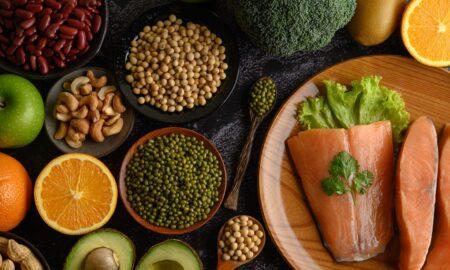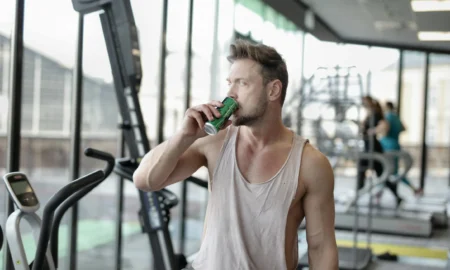It's been said that the way you eat can determine 80 percent of the way you look. If you want to build muscle and stay lean, you absolutely must follow an effective nutritional plan. Far too many people stumble in that important aspect of bodybuilding. By following these simple guidelines, you can design an eating program that will help you reach your goals.
1) Schedule Specific Times for Your Meals Each Day
One of the most important keys to building muscle, losing bodyfat and feeling energetic throughout the day is controlling your metabolism. That's the rate at which your body processes the nutrients in your food. They're absorbed and assimilated into the body and then converted into fuel and used for energy or excreted as waste.
Eating meals at specific times throughout the day helps you engineer a more effective, smoother-running metabolism. If you can increase the efficiency of your metabolism, you'll have a better chance of packing on more muscle and fending off more bodyfat over time. The 'mass' you eat will have a better chance of turning into mass on your body'in the form of high-quality muscle instead of fat.
The human body's famine-defense mechanism, or what it does to slow down the metabolism in the event that there's a long period of time without food, is to hold on to a safety reserve of bodyfat and conserve energy. If you can speed up your metabolism, your body will become conditioned to lower bodyfat levels, which in effect shuts down the famine-defense mechanism. Think of your body telling itself, 'I get fed so well and consistently, I don't need to carry around this extra bodyfat. I won't ever need it!'
Whatever challenges your life outside the gym may present, a workable eating plan is indeed possible. You just need to make sure you begin each day with a specific plan of attack for the timing of all your meals.
If you're not feeling hungry when it's time to eat a scheduled meal, that doesn't necessarily mean you're eating too much food. Many people who begin a well-structured diet consisting of the number of calories they need to meet their physique goals feel as if they're eating too much food at first. Just stick with it. If you don't get enough food to meet your body's requirements, your metabolism will begin to slow down to match your intake.
Plan a regimen of six to seven meals a day, and be consistent. It may take a couple of weeks for your metabolism to speed up to the efficiency it should be operating at to meet your bodybuilding goals. If you're persistent, your metabolism will eventually adjust to the increase in food. The quantity of food you're eating may make you feel full right now, but soon it won't be enough. You'll actually be hungry between meals and anticipating the next one.
2) Keep Your Diet Simple
Do you know people who always ask themselves, 'What am I going to eat for dinner tonight?' Some people put a lot of thought into deciding what they're going to enjoy at a future meal. In my opinion, that makes the eating process far too complicated. The more complicated you make your nutritional program, the more difficult it'll be to follow through on it. During the week I intentionally keep my meals plain and simple. My main purpose for eating is to grow muscle and keep my bodyfat levels manageable. If I decide to relax at all with my diet, it'll be during the weekend.
The less thinking and extra planning you have to do when it comes to feeding yourself properly, the better. Try to look at eating as merely a method of getting energy to build quality muscle, fuel great workouts and keep your body lean and looking good'instead of as a source of recreation, pleasure and a way of connecting with your family and friends.
Dining is one of life's great pleasures, but try adjusting your way of thinking about food so you can become an efficient muscle-building machine. Simple meals will help you be consistent in your eating.
3) Think Calories Consumed vs. Calories Burned
When you're trying to lose bodyfat, you need to make sure you're eating on a calorie-restricted plan. You can't just avoid fattening foods. When the day is done, you must burn more calories than you eat.
It doesn't matter if everything you eat is healthy, wholesome or 'clean.' The total calories you take in'no matter what kinds of food they come from'must be lower than the number of calories your body burns each day.
In the past I made a big mistake when trying to lose bodyfat. Even though I was extremely disciplined and stayed away from foods that obviously weren't good for me, like pizza and burgers, I still ate too much to lose fat as quickly as I wanted. Even with all my contest-preparation experience, I didn't fully understand the importance of restricting calories in meeting ambitious fat-loss goals. Even if you're only eating egg whites, chicken breasts, vegetables and protein powder, make the phrase, Calories consumed vs. calories burned, your mantra.
ALL4) Invest a Portion of Your Food Budget in a Quality Meal Replacement
Obviously, you want the calories you take in to be of the highest quality. You must place a high priority on consistently eating well and never skip a meal. As Paul Delia of AST says, 'Once you've missed a meal, it's gone forever.' You can't make up for it by eating two at the next scheduled time because the body can only assimilate so much food at one sitting. The excess will be wasted.
Eating every one of your scheduled meals is an important part of both the muscle-building and the fat-loss processes. Doing it consistently will have more of an effect on your physique than your training habits. When you miss a meal, you lose an opportunity to help your body grow muscle. The more of those crucial opportunities you miss, the less likely you'll be able to reach your bodybuilding goals.
That said, you want to invest a portion of your grocery budget in a convenient, quality meal replacement like AST's Ny-Tro PRO 40. Check the label. Many MRPs, as they're called, are an excellent alternative to regular food that can help you stick to your commitment'even with your busy schedule.
In some regards a quality meal-replacement powder is better than regular food because it provides high-quality nutrition with 100 percent of the vitamins and minerals a body needs to remain healthy. I'm able to get all that in fewer calories than it would take to get the equivalent amount of nutrients from regular food.
5) If You Want to Build Muscle Fast, Get Plenty of Quality Protein
One of the best pieces of advice I ever got came from Paul Delia many years ago. 'Skip,' he said, 'Muscle is protein. Protein is muscle.' Those simple but extremely powerful words have helped me continue to pack on rock-hard muscle year after year without all the frustrating plateaus a lot of other people experience. Of course, my training helped too'most recently the Max-OT system I described in 'Great Gains' in the April '03 IRONMAN.
If you're going to put so much effort into building a great physique, use a protein powder to pack power into your regular-food meals. That will get amino acids into your bloodstream almost immediately, while your body digests the other foods you've eaten.
Here's my mass-building nutritional plan:
Skip La Cour's Mass-Building Diet
Meal 1, 4:30 a.m. (preworkout)
1 scoop VP2 Whey Isolate
1 scoop Creatine HSC
Meal 2, 5:30 a.m. (postworkout)
1 scoop VP2 Whey Isolate
1 scoop Creatine HSC
Meal 3, 6:30 a.m.
1 scoop VP2 Whey Isolate
1 potato
Meal 4, 7:30 a.m.
1/2 packet Ny-Tro Pro 40
1 potato
Meal 5, 8:30 a.m.
1 scoop VP2 Whey Isolate
1 potato
Meal 6, 11 a.m.
1 scoop VP2 Whey Isolate
4 ounces chicken breast
2 pounds vegetables
1 tablespoon flaxseed oil
Meal 7, 1:30 p.m.
1 packet Ny-Tro Pro 40
Meal 8, 4 p.m.
1 scoop VP2 Whey Isolate
4 ounces chicken breast
2 pounds vegetables
1 tablespoon flaxseed oil
Meal 9, 5:30 p.m.
1 packet Ny-Tro Pro 40
Meal 10, 7 p.m.
1 scoop VP2 Whey Isolate
4 ounces chicken breast
2 pounds vegetables
1 tablespoon flaxseed oil
Meal 11, 9:30 p.m.
1 packet Ny-Tro Pro 40
6) Fall in Love With Vegetables!
If I had anything close to resembling a nutritional secret weapon, it would be to eat as many vegetables as you possibly can. I eat about five pounds of frozen vegetables a day.
Besides providing an excellent source of sustained energy, fibrous carbohydrates allow me to eat a greater volume of food than I could eat if it were starchy carbohydrates, such as rice, pasta and potatoes and with fewer calories.
Eating vegetables gives me more bang for my buck, so to speak. I can eat as much as I want and easily stay within my calorie allotment. That's a huge mental benefit when cutting down calories in an effort to lose excess bodyfat. Just about all the calories in the vegetables you eat are used by the work your body performs to digest them. The opposite is true with starchy carbs. So you must be very careful not to include too many starchy-carbohydrate calories in your diet'which is not hard to do.
Because vegetables have low glycemic-index values, I can manage my insulin levels much more efficiently than when I eat starchy carbohydrates. That means fewer ups and downs in my energy levels, fewer mood swings and less chance that any excess calories I eat will be stored as unwanted bodyfat. Eating vegetables also slows the digestive process, which ensures that my body efficiently uses the precious protein I eat to repair and build muscle tissue.
I'll be the first to admit that eating vegetables is not nearly as satisfying as eating a delicious bowl of rice or oatmeal. Now that I've weaned myself off those starchy carbohydrates, however, I hardly notice the difference.
Although many tout the benefits of eating fresh vegetables, don't be afraid to take advantage of the convenience of the frozen variety. There's only a slight difference between the nutritional values of frozen vegetables and fresh ones. Frozen veggies are definitely easier to prepare and are relatively inexpensive. Busy people just don't have time to clean and cut fresh vegetables. Instead of excluding those important foods, just take them out of the freezer and put them into your food container before you leave for work. By the time your midmorning meal comes around, they should be thawed. If you have access to a microwave, you can have delicious hot veggies in only a few minutes.
7) Eat Before Your Workouts and Take Advantage of the Three-hour Window of Muscle-building Opportunity Afterward
Intense weight training and cardiovascular work drain your muscles of their limited protein stores. Within a very short time after you start training, you'll be running on empty. That's incredibly detrimental to muscle growth and repair'and the effects are magnified the more intensely you train. You must have an efficiently burning source of protein in your body that it can quickly access during your workouts, and you should eat it with a high-glycemic-index source of carbohydrates.
All training lowers your blood sugar levels, and when that happens, your muscles have difficulty getting the protein they need to maintain their size. The high-glycemic carbohydrates spike your blood sugar and actually force the high-quality protein into your ravenous muscles.
I took my nutritional program to the next level when I started following an intelligent preworkout plan. If you want to preserve as much muscle mass as possible, you should start eating a small protein-based meal with a high-glycemic carbohydrate before every one of your weight-training and cardiovascular sessions.
Equally important as eating properly before you train is the need for an effective postworkout nutritional plan. You should eat a small meal containing a high-quality protein source and high-glycemic carbohydrates after your weight-training and cardio workouts. It will protect the muscle you've already built and immediately kick the important muscle-recovery process into gear.
If you tear it up in the gym, your muscles are likely to be depleted of their valuable protein stores'even if you did eat before the workout. Your blood sugar levels are lowered by training as well, and that means your muscles will have difficulty getting the protein they need to maintain their size.
Certified personal trainers have asked me why I would eat a protein/creatine mixture right after beating myself up on the recumbent bike. 'Aren't you hindering the fat-burning process that you started by doing cardio when you eat so soon afterward?' is the way they put it.
I, too, used to believe that you shouldn't eat anything for a period of time after a cardiovascular session. I must have read somewhere that it would cause the body to stop using stored bodyfat as fuel and instead start using the food you'd just eaten.
The fact is, effectively burning bodyfat has far more to do with the calories-consumed-vs.-burned. principle. You don't really burn enough fat during your training to overrule the importance of protecting your starving muscles from the damage caused by exercise.
During the past year I also learned about the importance of the critical three-hour window after an intense weight-training session, when the body needs and uses the fuel you gave it more than any other time of day. To take advantage of the anabolic window, as it's called, I stacked four nutrient-dense meals within that three-hour period of time. I ate the first one immediately after I trained (5:30 a.m.), the second an hour later (6:30 a.m.), the third meal one hour after that (7:30 a.m.) and the fourth at 8:30 a.m.
For the first time in my bodybuilding career I did not eat equal amounts of food spaced evenly throughout the day. Instead, I fed my body when it was the most receptive to food'and I didn't eat as much food when I didn't really need it. In the past I ate a lot of extra food because I thought that was what I had to do in order to continually build muscle. My new strategy enabled me to effectively build muscle all year long because I supplied my body the nutrients it needed exactly when it needed them.
From some of the pictures Mike Neveux took during my IRONMAN photo shoot last summer, it looks as though I gained five years of muscle maturity in just 12 months! I firmly believe it was the new eating strategy more than any other factor that that helped me achieve such incredible development.
8) Don't Eliminate Carbohydrates When Trying to Lose Bodyfat
Many dieting bodybuilders choose to go on extremely low-carbohydrate diets. Low-carb diets can help you shed bodyfat. There's no doubt about it. They're effective because they can create a deficit between the calories you eat and the calories you burn every day.
Unfortunately, the weight you lose on a low-carbohydrate diet will include some of the muscle you've worked so hard to put on'along with the unwanted bodyfat. You may not be satisfied with sacrificing that much muscle on your way to dumping your fat. You can improve your ratio of muscle lost to fat lost simply by making a few minor adjustments to your nutritional plan.
In the past I, too, was a big advocate of low-carbohydrate diets. They helped me get ripped'but they didn't help me protect the muscle I'd built. And you can forget about building more muscle when you're following one. A more efficient approach to dieting could have helped me get just as lean and assisted me in preserving and building muscle at the same time.
Drastically reducing your carbohydrates is not as critical to losing bodyfat as you might think. In fact, eliminating carbohydrates at important times of the day can prevent you from reaching your muscular potential.
Carbohydrates are an essential part of the muscle-building process. Instead of trying to eliminate them altogether, you should make sure you're eating the right types of carbohydrates at the right times of day. See item 7 for a description of how I use high-glycemic carbs in my preworkout and postworkout nutrition plans.
9) Plan Your Cheat Meals and Cheat Day in Advance
Cheat days, or predetermined day on which you enjoy not-so-healthy foods every week'or every two weeks or every month'can be a very effective diet strategy. They make it easier to eat the way you must in order to build muscle and stay lean. Cheat days turn your structured diet into a series of sprints, so to speak, rather than one endless marathon.
Keep in mind that a cheat day is nothing more than a mental break from your structured, disciplined eating habits. Unlike what some people mistakenly believe (or want to believe), there are no physical benefits to cheat-day eating, so you should exhibit some self-control. Eat enough to satisfy your cravings without adding too many unnecessary calories and disrupting the efficiently running metabolism you've worked so hard to create.
I've always known that eating a reasonable amount of junk food from time to time wasn't going to bring my physique-enhancing progress to a screeching halt, but I had trouble finding the right balance between indulging too much and totally depriving myself. I always felt uncomfortable eating fattening foods because in the back of my mind I knew that the short-term pleasure would be negated by all the hard work and sacrifice it would take to get rid of the bodyfat I'd accumulate. And I don't like the feeling of walking around fat and unhealthy.
What I've discovered is that one planned cheat day a week is the right balance for me between enjoying life and moving closer to my bodybuilding goals. After eating a 'clean' diet all week long, I take Saturday as my official cheat day. That works well for my social life because that's when most 'regular' people schedule weekend activities and fun. My Saturday cheat days get me one step closer to that seemingly out-of-reach goal of balance in life.
Physically, you keep your bodyfat levels down because you're only eating junk food one day a week'not three days some weeks, one day on other weeks and zero days on others. Because the cheat days are planned, it becomes easier to relax and enjoy the food you're eating. You actually feel that you deserve to enjoy it because you've been disciplined all week long. There's no doubt that you'll enjoy the eating experience even more if you feel that way.
You don't necessarily have to eat junk food on your cheat days. There are other ways to cheat on your diet. I sometimes relax on those days and miss a scheduled meal'or sometimes even several meals'so that I can focus on other areas of my life without feeling guilty.
10) Stop Searching for the Easiest Diet
Finding the so-called perfect diet has become a huge distraction for many people. Unfortunately, the desire to discover a painless alternative to sacrifice and discipline prevents them from even getting started.
By 'perfect diet' I'm referring to a diet that tastes good, allows you to eat plenty of food and helps you shed bodyfat and build muscle quickly and painlessly. It must not be so strict that you can't go off it every once in a while'or whenever you want, for that matter'without impeding your progress. Now, I'm exaggerating about what some people hope an effective fat-loss diet will be'but I'm probably not exaggerating as much as you might think.
As I always say, God puts a pricetag on everything. If you've accumulated some excess bodyfat and desperately want to get rid of it, you're going to have to pay the price. That might mean spending a little more time sweating on a treadmill, feeling hungry on occasion, skipping a few of those cheat meals you've budgeted into your eating regimen or all of the above. Whatever method you choose for losing bodyfat, there will be some sacrifice, discipline and pain involved. Anyone who tells you otherwise is just flat-out misleading you.
If you have too much bodyfat, you're simply eating too much food, not burning enough calories, not dieting for a long enough period of time or a combination of those factors. It's not because you haven't found the 'right' diet for your body yet'or because you're cursed with an incredibly slow metabolism.
It's not that you don't know enough about nutrition or the intricacies of dieting or that you don't have enough bodybuilding and training experience. It's not because your ratio of protein to carbohydrates to fat is 40-40-20 instead of 50-40-10 or even 50-30-20. It isn't because you're carbohydrate sensitive. Or because you can't afford the right nutritional supplements. And it isn't because your body has hit a plateau.
If you're carrying more bodyfat than you'd like, the problem is that you're eating too much food to meet your objective'period. You must either eat less food or lower your expectations.
Editor's note: 'Mass Machine II: Skip La Cour's Training and Instructional Video Set' is red hot! It breaks down the strategies you need to effectively stimulate muscle growth and presents the exercises and training techniques that Skip has used over the years to win two NPC T.U. Overall titles and five Heavyweight Championships. Get the two-part video set (two tapes; two hours' running time) for only $49.99 plus $7.50 shipping and handling, a total of $57.49. For international orders add $15 for shipping and handling, for a total of $64.99. Order online at www .skiplacour.com. Or send a check or money order to Skip La Cour, 712 Bancroft Road, #259, Walnut Creek, CA 94598. For credit card orders call 1-800-655-0986. IM




















You must be logged in to post a comment Login